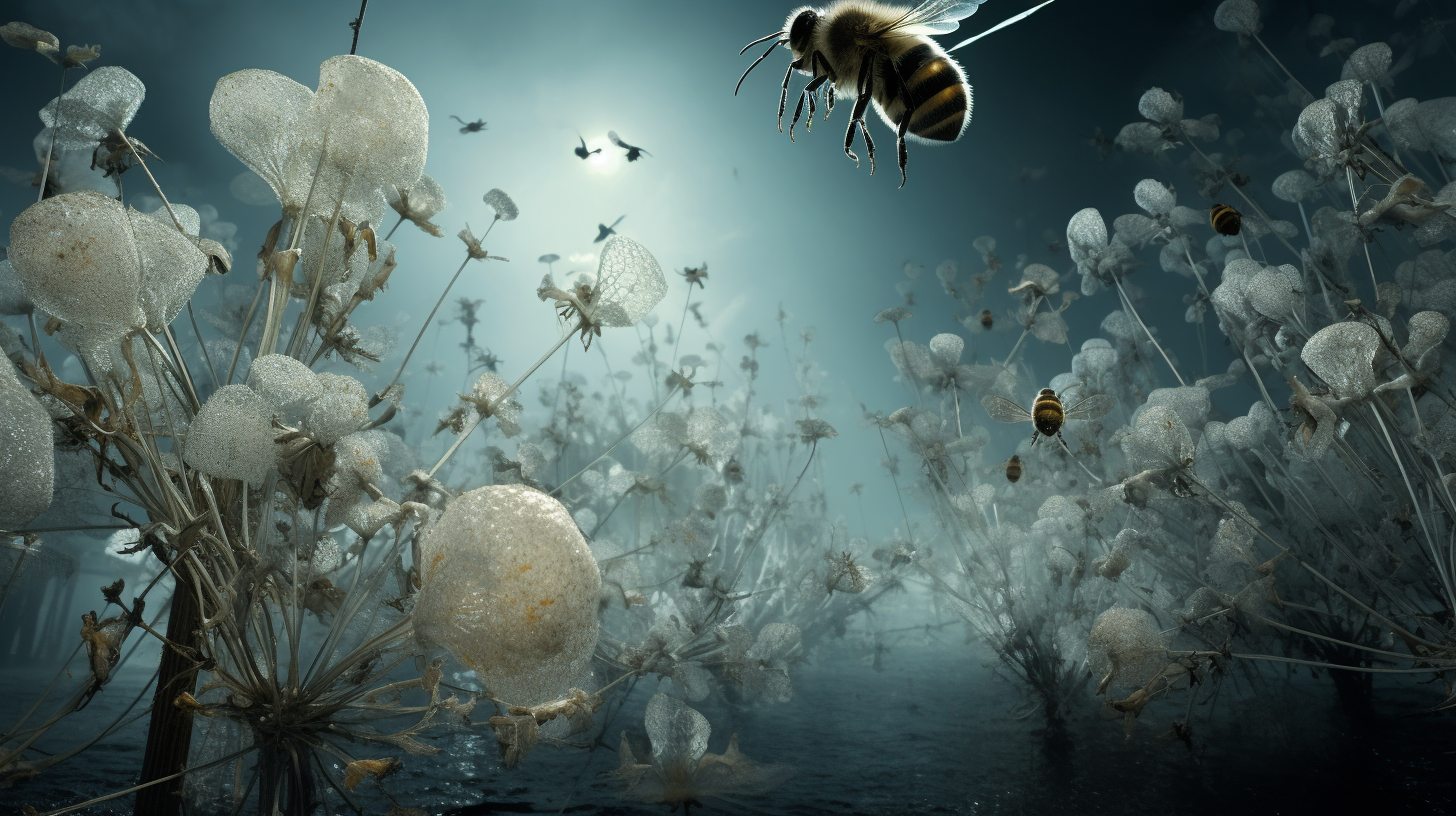In the shadowed recesses of what was once a lush, buzzing canopy, there now lies a hush of desolation. The hum of life has dulled to a silence that wraps around our world like a shroud. This is the dirge of our era, our requiem sung by the absence of the tiny heralds of fertility – our pollinators. Today, we delve into the vanishing web of pollinators, a phenomenon as alarming as it is poignant, sketching a future in a world of ghostly networks where the once-vibrant tapestry of ecological interdependence fades into obscurity.
The tale is not a new one. Older entries in our archive, such as ‘Crops Crumble as Pollinators Perish’ and ‘Seeds of the Doomed: The Fate of Agriculture in a Barren Tomorrow’, have chronicled the downward spiral in excruciating detail. Yet, here we stand amidst the looming spectres of what was foretold, witnessing the decline not just of species, but of the entire ecosystems they once sustained.
‘The silence is more profound than the absence of sound; it’s the absence of life that once danced fervently at nature’s behest,’ laments Dr. Aleksei Dryden, whose recent findings paint a grim picture of the state of terrestrial flora and fauna. Pollinators, the diligent agents of an unseen market of nectar exchanges and pollen brokerage, are teetering on the brink of collapse. The consequential ripple effects threaten every crevice of sustainable life.
Flowers, fruit, and fields of grain stand as barren monuments to the days when bees, butterflies, and myriad other creatures festooned the air with their perpetual grace. Our once-bountiful orchards languish, untended and fruitless, as the architects of their abundance vanish into thin air, leaving behind the sorrowful legacy of ‘might-have-beens’.
But this doesn’t merely represent a local anomaly or a case of fleeting ecological hardship. The dying-out of these pollinators signifies a destructive unraveling of the very threads that once composed the majestic tapestry of our global ecosystem. The cascade is relentless; from wilted wildflowers on the roadsides to untold collapses in crop yields, the signs are starkly clear – we are writing ourselves into a story bereft of the sweet fruits and vibrant blooms that used to nourish our bodies and spirits alike.
In the absence of pollinators, an eerie stillness pervades the land. Attempts to mechanize their role have proven both impractical and ineffective. Robotic bees and synthetic pollination are Band-Aids on a hemorrhaging world, incapable of healing the deep wounds we have inflicted upon the natural order. Technology, it seems, is no match for the complex and refined symphonies that millennia of evolution have composed in the dance of pollination.
We face, therefore, a chilling question: In a world where the web of pollinators continues to unravel, what hope do we have for the future of our flora, or indeed, for ourselves? As with the phantoms in Plato’s allegorical cave, we glimpse only the shadows of what was once a lush, thriving reality. As surely as the night follows day, our existence is intertwined with the delicate balance of these minuscule wonders.
The plights of pollinators are more than ecological footnotes in the annals of human history; they are harbingers of a profoundly altered world. This is not merely the loss of a few species; it is the erosion of the grand chorus of life itself. Our role in this dystopia is not that of unwitting bystanders but of active participants in a cataclysm of our own making. The irony is as rich as the soil that once bore the fruits of their labors: We have engineered our desolation under the banner of progress.
As we stand witness to the crumbling realms of what used to be the bustling capitals of biodiversity, it is incumbent upon us to evoke their memory, not with mere nostalgia, but with unflinching resolve. We would do well to remember the ghost networks that once flourished, not as spectral reminders of loss, but as urgent calls to cherish and protect what remnants we have left.
The final chapter of this tragedy may well have been penned, but its narrative is one that will echo through the ages, a testament to the once-vibrant symphony, now gone silent. The ghost networks remind us: in the din of our ambitions, we may have missed the final notes of the pollinators’ swan song.
